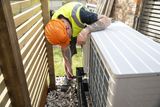Four-day working week trial to launch today
Stock image
A new trial programme to test out a four-day working week is being launched today.
The six-month programme aims to test out the benefits and effectiveness of a four-day working week and is being driven by the Four Day Week Ireland campaign.
The campaign claims not only can a four-day working week benefit employees by striking a better work/life balance but can also improve productivity for businesses. No loss of pay will be experienced by employees involved in the scheme.
Businesses and employers that wish to pilot the scheme will receive training, supports and mentoring to ensure the transition to the four-day week happens smoothly.
Government have also committed to funding research into the four-day week pilot, with a grant of up to €150,000 available to the winning candidates.
The campaign is being run by several trade unions, organisations and academics, with a Fórsa representative writing to all local authorities to urge them to adopt a four-day week as part of the pilot scheme in recent weeks.
"In the last year we have seen radical shifts in our working practices. More flexible ways of working are here to stay, Joe O'Connor, Chairperson of the Four Day Week Ireland, told RTÉ.
"The launch of the four-day week pilot programme represents an exciting moment of change for employers and employees, and it’s up to the business community now to show that they are willing to lead and support this change for the better," Mr O’Connor said.
Mr O’Connor said the four-day week, with no loss of pay or productivity, offered the potential of a genuinely better future for workers, employers and the environment.
“The strong support for a four-day working week among Irish people is consistent with similar studies internationally. What may once have seemed like a radical concept is now, for many, a reasonable and rational ambition,” he said.
Read more
The Department of Enterprise, Trade and Employment along with the Department of the Environment, Climate and Communications has also issued a call for proposals for reseacg into how a four-day week might affect areas such as gender inequality, staff well-being and job satisfaction. The research could also cover macro-economic impacts, employment levels, competitiveness of businesses and staff productivity; gas emissions, environmental pollution and resource or energy consumption.
The Government is offering a grant of up to €150,000 to the successful research applicant, with applications accepted from July 1.
Tánaiste Leo Varadkar said the pandemic has “caused us to rethink and re-evaluate how we work”.
“It’s been shown that huge numbers of people can be just as productive while working at home rather than having to come into the office every day and it has accelerated the shift towards more flexible and family-friendly working hours,” he said.
Mr Varadkar described the idea of a four-day working week as “ambitious” and said it was "too early to say whether a four-day working week could work in Ireland”.
“The idea is ambitious, to achieve the same outcomes and productivity, for the same pay with 20pc fewer hours worked. I can see how that might work for some roles but it’s hard to see how it would work in others particularly in health, education and manufacturing for example.”
“But we need to keep an open mind when it comes to innovations in the world of work. Ideas like annual leave, maternity and paternity leave and flexitime were once seen to be radical and are now the norm,” the Tánaiste said.
Minister for the Environment Eamon Ryan TD said the recovery from the pandemic gives Ireland “a chance to improve and reimagine our working lives in a way that benefits people and the environment”.
“We’ve seen how adaptable and flexible people can be even in difficult circumstances, and we want to find out more about how we can keep some of the gains that have been made in terms of less commuting and more family time. A four-day week could help us cut carbon emissions and air pollution, improve people’s work-life balance and support gender equality. We need to look at the potential and assess the impacts of such a change, and this research will help us figure that out,” the Green Party leader said.
The initiative will begin in January and will be part of a global pilot with various nations adopting the programme. Unions say several businesses have already signed up, including Donegal-based digital publishing company 3D Issue.
Denmark and the Netherlands have been the frontrunners with regard to a four-day working week with Danish municipalities adopting the innovation in 2019.
Join the Irish Independent WhatsApp channel
Stay up to date with all the latest news















